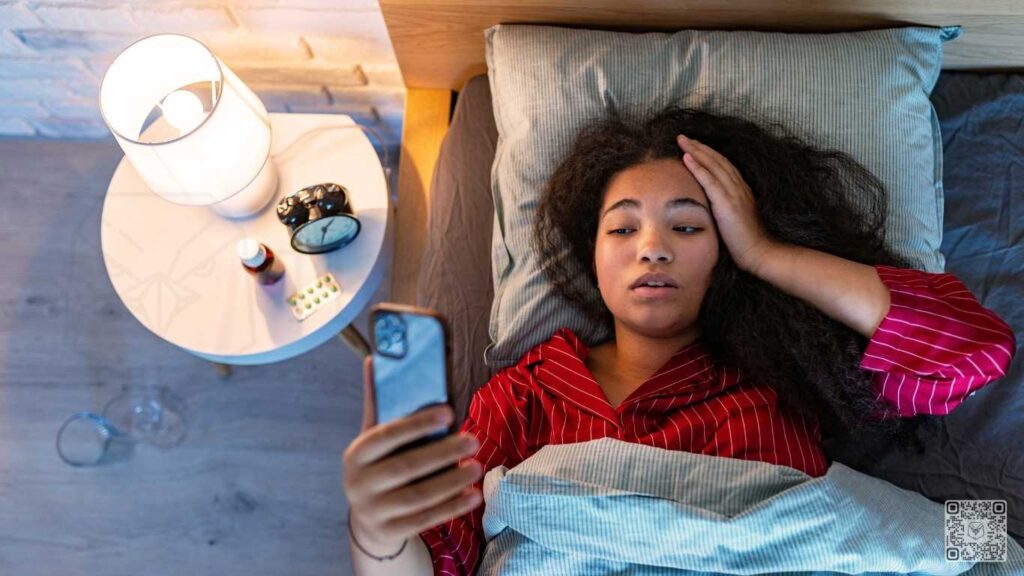
Introduction
In today’s fast-paced world, technology is an integral part of our lives. From smartphones and laptops to streaming services and social media, digital devices have transformed how we work, communicate, and unwind. However, this technological convenience comes at a cost—our sleep.
Numerous studies highlight the adverse effects of screen time on sleep quality, with many individuals experiencing disrupted sleep patterns due to excessive use of digital devices, particularly before bedtime.
This article explores how technology impacts sleep and provides actionable tips to combat tech-induced sleep disturbances.
The Science Behind Sleep and Technology
- The Role of Blue Light:
- Electronic devices emit blue light, which interferes with the production of melatonin, the hormone responsible for regulating sleep-wake cycles.
- Exposure to blue light in the evening tricks the brain into thinking it’s still daytime, delaying the onset of sleep and reducing overall sleep quality.
- Mental Stimulation:
- Engaging in activities such as scrolling through social media, playing video games, or answering work emails keeps the brain active and alert.
- This mental stimulation can make it harder to relax and fall asleep.
- Disrupted Circadian Rhythms:
- The circadian rhythm, our internal biological clock, is influenced by light exposure.
- Prolonged screen time in the evening disrupts this rhythm, leading to irregular sleep patterns and difficulty waking up in the morning.
- Psychological Effects:
- Constant connectivity and notifications can create anxiety and stress, further impacting sleep quality.
- Fear of missing out (FOMO) often compels individuals to stay online longer than intended.
The Impact of Poor Sleep on Health
- Physical Health:
- Sleep deprivation weakens the immune system, increases the risk of chronic conditions such as heart disease and diabetes, and contributes to weight gain.
- Mental Health:
- Poor sleep exacerbates anxiety, depression, and mood swings.
- It also reduces cognitive functions like memory, concentration, and decision-making abilities.
- Productivity and Performance:
- Sleep-deprived individuals experience reduced productivity, slower reaction times, and impaired problem-solving skills.
Tips to Combat Tech-Related Sleep Disturbances
- Establish a Digital Curfew:
- Set a rule to stop using electronic devices at least one hour before bedtime.
- Use this time for relaxing activities like reading a physical book, meditating, or taking a warm bath.
- Create a Sleep-Friendly Environment:
- Make your bedroom a tech-free zone by removing TVs, computers, and phones.
- Invest in blackout curtains, white noise machines, and comfortable bedding to enhance sleep quality.
- Use Blue Light Filters:
- Many devices offer night mode or blue light filter settings that reduce the emission of blue light.
- Alternatively, consider investing in blue light-blocking glasses.
- Limit Screen Time:
- Monitor and reduce overall daily screen time by setting app usage limits or using digital wellbeing tools.
- Engage in outdoor activities or hobbies that do not involve screens.
- Practice Good Sleep Hygiene:
- Maintain a consistent sleep schedule, going to bed and waking up at the same time every day, even on weekends.
- Avoid caffeine, heavy meals, and alcohol close to bedtime.
- Mindful Technology Use:
- Use apps designed to promote relaxation and mindfulness, such as guided meditation or nature soundscapes.
- Avoid consuming distressing or stimulating content before bed.
- Leverage Technology for Better Sleep:
- Smart devices like sleep trackers and apps can help monitor sleep patterns and suggest improvements.
- White noise machines or apps can create a calming sleep environment.
The Role of Parents and Guardians
- Setting an Example:
- Parents should model healthy screen habits, such as avoiding devices during family time or before bed.
- Establishing Boundaries:
- Create household rules regarding device usage, particularly for children and teenagers.
- Encourage non-digital bedtime routines, like storytelling or journaling.
- Parental Controls:
- Use parental control settings to limit screen time and restrict access to stimulating or inappropriate content at night.
Workplace Implications
- Remote Work Challenges:
- With the rise of remote work, employees often struggle to disconnect from screens, leading to blurred boundaries between work and personal life.
- Encouraging Healthy Practices:
- Employers can support employees by promoting work-life balance, offering flexible hours, and discouraging after-hours emails.
The Future of Sleep and Technology
- Innovations in Sleep Tech:
- Emerging technologies, such as smart mattresses and wearable devices, are designed to optimize sleep quality by tracking patterns and providing insights.
- Research and Awareness:
- Ongoing studies continue to shed light on the relationship between technology and sleep, helping to inform better practices and solutions.
- Designing for Sleep:
- Tech companies are increasingly incorporating features that prioritize user wellbeing, such as downtime settings and app timers.
Conclusion
Technology has undoubtedly transformed modern life, but its impact on sleep patterns is a growing concern. The blue light from screens, mental stimulation, and disrupted circadian rhythms contribute to widespread sleep disturbances, affecting physical and mental health.
By adopting mindful technology practices, creating tech-free bedtime routines, and leveraging innovations for better sleep, individuals can mitigate these effects and reclaim restorative rest.
As society becomes more aware of these challenges, a collective effort is essential to balance our digital lifestyles with the need for healthy sleep—because, in the end, quality sleep is not just a luxury but a fundamental necessity for overall well-being.